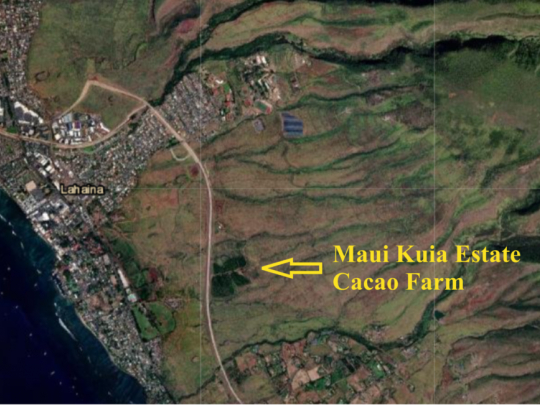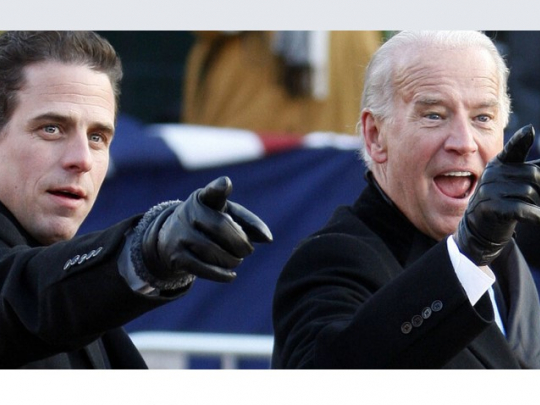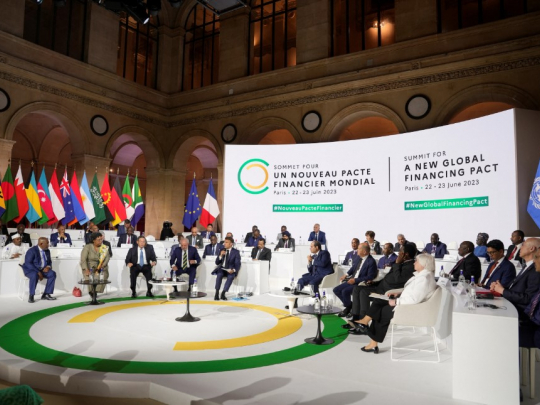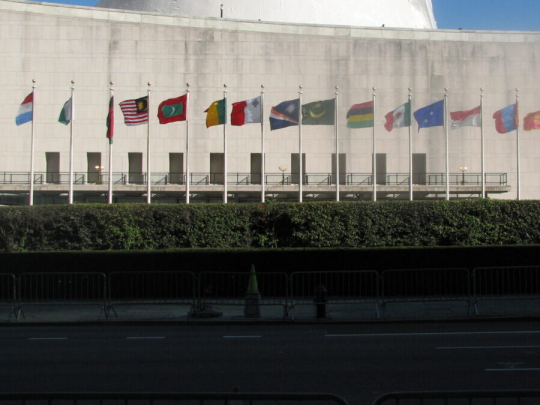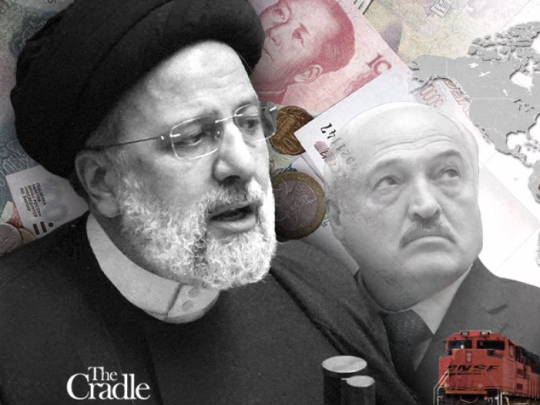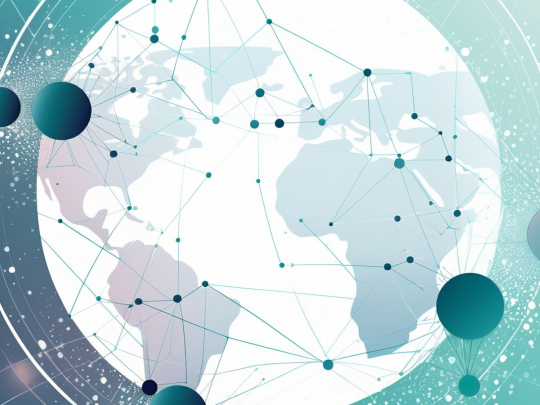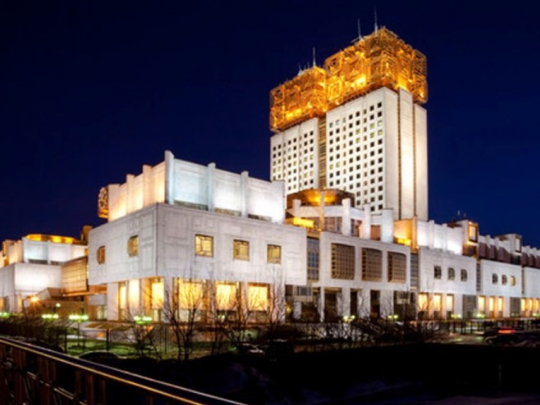Busting European Union myths on causes of global food and energy disruptions
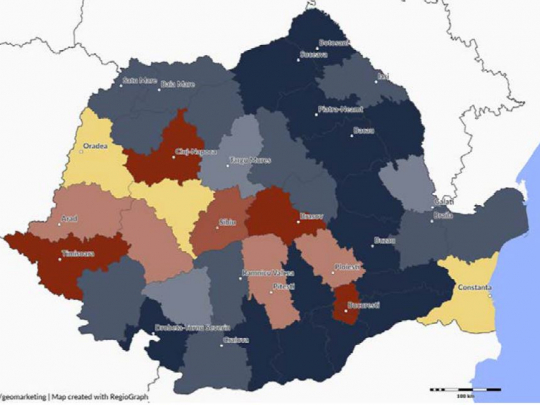
1. Myth: The Special Military Operation of the Armed Forces of the Russian Federation in Ukraine and Donbass has endangered the world’s food supply (Source: Comments by EU High Representative for Foreign Affairs and Security Policy/EU Commission Vice-President Josep Borrell following the EU Foreign Affairs Council, 11 April 2022, Brussels).
Fact: The UN warned about a risk of a global food crisis two years ago. The growth of agri-food prices over the recent years is being driven by the fallout from the COVID-19 pandemic, the short-sighted economic and energy policies by major Western economies, trade wars, unfavorable weather conditions, the illegal unilateral restrictions imposed by the West against Russia as well as the underfunding of the agricultural sector.
Nevertheless, according to UNCTAD data, there appears to be no global physical shortage of food. The issue is in its distribution structure. The price factor also plays a role.
The spike in agri-food prices was recorded already in 2020 and was not a consequence of the Special Military Operation. The FAO Food Price Index (FFPI) rose by 50% between 2019 and 2022. According to stock exchange data, wheat prices rose by 25% in 2021. By February 2022 they were already 31-62% higher than the average for the previous five years. Maize prices have risen by 162% over the past two years. Rapeseed – by 175%.
The COVID-19 pandemic resulted in the severe disruption of global supply, production and logistics chains. A surge of financial injections into the EU, US and Japanese economy to boost post-pandemic recovery caused a significant increase in demand and, consequently, soaring inflation. Meanwhile, food stocks were at their lowest level in 5-10 years. The EU’s ill-advised headlong “green energy” transition led to record energy prices. This, in turn, triggered a rise in agricultural production costs: fuel and electricity prices rose substantially (oil prices – by more than 22% in 2020-2022, the average price of electricity in Europe reached its historic highs in March 2022 – by 350-530 % in some European countries compared to the same period in 2021). This was immediately reflected in fertilizer (carbamide and saltpeter prices skyrocketed by 3,5-4 times, others – by 2,5-3 times) and cereal production. These factors were compounded by unfavorable weather conditions and natural disasters in some parts of the world. Transport expenditures grew due to anti-COVID international travel restrictions, logistics disruptions and freight volume decline. Freight rates almost doubled. The devastating effect on the global economy was compounded by the unilateral and illegitimate Western restrictive measures against Russia, including barriers on delivery of goods, payment difficulties, transaction bans, and customs problems, which have become an additional risk factor for global food security.
The EU openly declared an all-out economic and trade war against our country – in full oblivion to Russia’s standing as a key global supplier of basic agricultural products (wheat, barley, sunflowers, mineral fertilizers and fodder crops), including to low-income countries, that are subject to risks of food shortages.
Instead of making groundless allegations European leaders should rather turn their attention to redressing the systemic miscalculations in their own macroeconomic, monetary, trade, energy and agro-industrial policies. They should stop attracting commodity flows at the expense of developing countries and abandon the perverse practice of imposing unilateral restrictive measures against international law.
2. Myth: Russia is occupying Ukrainian lands and shelling Ukraine's farmlands. The sowing campaign in Ukraine in 2022 is under threat. (Source: Blog post of EU High Representative for Foreign Affairs and Security Policy Josep Borrell «Food Insecurity: The Time to Act is Now», 7 April 2022)
Fact: The objectives of the Special Military Operation of the Armed Forces of the Russian Federation are to protect the civilian population of the Donetsk People’s Republic and the Lugansk People’s Republic from the existential threat posed by the neo-Nazi “volunteer battalions”. The Russian military does not seek to occupy the territory of Ukraine. It is engaged in compelling Kiev to peace on the terms of demilitarization, denazification and ensuring a neutral and a non-nuclear status of the country that would cease to pose a threat to both a significant part of its own population and its neighbours.
Kiev authorities confirm that this year’s sowing campaign is ongoing in all regions of Ukraine. The pace of its implementation is 20-30% lower than last year. By mid-May circa 8.6 Mln hectares of land were sown with various crops, i.e. down 24% compared to last year. This slowdown is due to a number of reasons, including shortage of fuels and lubricants (diverted to prop up the Ukrainian military), mobilization of the male population, as well as mining of arable areas and sea lanes. Nevertheless, the Prime Minister of Ukraine D.Shmygal on May 11th acknowledged that «despite well-known difficulties» Ukrainian agrarians have «coped with the task».
3. Myth: Russia is intentionally destroying Ukrainian agriculture, including machinery, granaries and infrastructure. (Source: Address by President of the European Commission Ursula von der Leyen at the World Economic Forum in Davos, 24 May 2022)
Fact: The EU is habitually misleading the international community, while twisting facts. Tellingly, the European Commission as well as Ukrainian outfits that are peddling such allegations (“Ukrainian Environmental Group” NGO, Committee on Agrarian and Land Issues of Ukraine, etc.) have so far failed to provide any documentary evidence to support them, including photo and video materials. There is also no publicly available data regarding the quantity and particulars of allegedly destroyed agricultural infrastructure and machinery.
Russia has an interest in seeing Ukraine, as well as the Donetsk and Lugansk People’s Republics, remaining self-sufficient, including in terms of food security. This is in line with Russian national interests and also conducive to the reduction of migrant flows towards our country. We are undertaking all necessary measures in this regard. Within the recently liberated regions the sowing campaign is already underway, and land amelioration efforts, including infrastructure maintenance, is ongoing. Producers from various Russian regions are set to provide vegetable and grain crop seed material for shipment to the Donetsk and Lugansk People’s Republics. 40 tonnes of seeds have already been delivered to the Donbass. Meanwhile in the south of Kherson region the Russian military has engaged in humanitarian demining of agricultural lands having defused more than 12 thousand explosive devices. Over 200 hectares of land have been cleared of mines within the liberated territories of the Donetsk and Lugansk People’s Republics.
Against this backdrop, having actively inflamed tensions around the looming global food crisis, the EU has mobilized a full-scale campaign to rapidly retrieve millions of tonnes of Ukrainian grain to the EU. Approximately 20 million tonnes of grain are planned to be shipped westwards by July 2022.
To this end transport corridors are being established to bypass sea routes that have been blocked by Kiev. Additional trucks, freight cars and barges plan to be promptly redirected to the Ukrainian border for grain transports. Railway schedules are being updated to include extra slots for Ukrainian grain consignments. Customs duties for Ukrainian imports have been lifted for a year. Enormous quantities of grain, corn and oil plants are being hastily moved from Ukraine, as evidenced by countless publicly available videos. Nevertheless, the West feels at ease with cynically blaming Moscow for Bolshevik-style crop seizures of Ukrainian grain stocks and agricultural machinery.
The EU-led campaign to relieve Ukraine of its grain stocks is bound to engender doubts about the final destination of this produce and the extent to which it is intended for shipment to third countries, in whose best interests the EU is supposedly acting. There is good reason to believe that profits from selling these agricultural products are being used to pay for Western arms and military equipment deliveries to Ukraine.
Thus, history is being repeated in Ukraine. In February 1918 German and Austrian troops entered Ukrainian territory with the backing of the Central Rada under the pretext of defending it against Soviet Russia. In return 37 thousand railcars with Ukrainian food supplies were dispatched to Berlin and Vienna.
The true worth of Western “humanistic values” has been exemplified by the COVID-19 crisis, i.e. when dealing with the issue of vaccine distribution and supplies. Practice has shown that such assistance measures are intended, above all, to promote the geopolitical interests of the European Union.
Moreover, the EU aims to continue hauling in large quantities of food supplies from Ukraine even in spite of the significant decline in crop production there this year, predicted by international experts. The inevitable impacts of these policies on ordinary Ukrainians, including price spikes and food shortages, are obviously not taken into consideration.
In short, it is the European Union that has been complicit in undermining agriculture, and not just in Ukraine.
Since 2014 the EU has not paid much concern to food security in the Donetsk and Lugansk People’s Republics. Moreover, following Russia’s recognition of the republics as independent states on 23 February 2022 the EU imposed trade embargo on both of them, banning, among others, the export of agriculture machinery there.
4. Myth: Russia is blocking grain supplies via the Black Sea. (Source: Comment by President of the European Council Charles Michel during his visit to Odessa on 9 May 2022)
Fact: Actions by Kiev authorities are the only obstacle in the way of commercial vessels entering and departing from Black Sea ports of Ukraine. Upon Kiev’s decision approximately 420 naval mines of an outdated design have been placed in the basin of the Black Sea and the Sea of Azov. Due their technical inadequacy these mines are coming off of their anchors (cables) and are thus putting all vessels of the Black Sea states at risk. The Ukrainian origin of the naval mines has been confirmed, their precise location is unknown. Earlier some of these mines were cleared near the coast of Romania and Turkey. These explosive devices are frequently uncovered near the coastal strip of the Odessa region. Civilian vessels have been targeted by the Ukrainian military on a number of occasions since the launch of the Special Military Operation and the threat of their shelling remains.
Consequently, dozens of foreign vessels remain confined to the ports of Nikolaev, Kherson, Chernomorsk, Ochakov, Odessa and Yuzhny.(as at 31 May 2022 – 70 vessels from 16 countries).
Russia undertakes all possible measures to ensure the safety of maritime traffic in the Black Sea and the Sea of Azov. The seaport of Mariupol has been cleared of naval mines and has resumed normal operations. As a result of a series of measures taken by the Russian Navy humanitarian maritime corridors are being opened on a daily basis from 08.00 to 19.00 (Moscow time) in the Sea of Azov (length 115 miles, width 2 miles) and the Black Sea (length 139 miles, width 3 miles).Their coordinates and details have been widely circulated among the international community. In the Mariupol area this corridor is fully operational. In the Odessa region it is the responsibility of the Ukrainian side to ensure the safety of vessels leaving ports and proceeding to the assembly area. Kiev avoids liaising with representatives of foreign states to which the vessels belong in order to ensure their safe passage to the assembly area.
The humanitarian corridor in the Black Sea has been open since 27 March 2022, therefore allegations regarding the “blockade” of the passage of Ukrainian vessels are baseless.
Russia has repeatedly called upon the international community, above all, the International Maritime Organisation, to use its influence over officials in Kiev and undertake measures aimed at de-blocking and ensuring safe departure of foreign vessels from ports of Ukraine.
5. Myth: Russia is weaponising grain stocks and reducing grain and fertilizer supplies in response to Western sanctions. (Source: Speech by President of the European Commission Ursula von der Leyen at the World Economic Forum in Davos, 24 May 2022).
Fact: The Russian Federation as a responsible member of the global food market is committed to faithfully fulfilling its obligations under international contracts in terms of exports of agricultural commodities, fertilizers, energy resources and other critical products.
We are deeply concerned about a possible food crisis and are well aware of the importance of supplies of socially important commodities, including food, to the socio-economic development of countries in Asia, Africa, Latin America and the Middle East and the achievement of SDGs.
Russia expects to have a good wheat harvest this year, which will allow our country to offer 25 million tonnes of grain for export from 1 August 2022. Our capacity for exporting fertilizers from June to December 2022 will amount to at least 22 million tonnes (20% of global consumption over this period).
Since the launch of the special military operation Russia has continued to provide humanitarian assistance to countries in need through bilateral and multilateral channels. Via the UN World Food Programme Russian food aid was delivered to Lebanon, Tajikistan, Kyrgyzstan, Cuba, Yemen and Sudan. On a bilateral basis assistance was provided to Sudan and Cuba - 20,000 tonnes each.
Meanwhile, illegitimate unilateral restrictions imposed by the EU, the US and their satellites remain the main obstacle to normal export relations between Russia (and Belarus) and buyers of grain and fertilizers.
The sanctions regime imposed by Brussels, aimed at undermining the Russian economy, affects the fundamentals of foreign economic activities of Russian companies, including those in the agro-industrial sector, limiting their ability to produce fertilizers and agro-industrial products and restraining their export capacity not only to the EU, but also to third countries. The ongoing EU economic blockade of Crimea and Sevastopol, including restrictive measures against Crimean ports, is an additional factor that has a negative impact on global food security.
Against this background the European Union is bluntly using the theme of Russia's supposed "responsibility" for the deteriorating situation with global food security in order to induce certain third countries to align themselves with the anti-Russian policies of the West.
6. Myth: EU sanctions against Russia do not affect on food security, since the agricultural sector of the Russian economy is not the target of EU restrictions. (Source: Blog post of EU High Representative for Foreign Affairs and Security Policy Josep Borrell «Food Insecurity: The Time to Act is Now», 7 April 2022)
Fact. To date, the EU, the US and their partners have imposed massive unilateral restrictive measures against Russia that are unprecedented in scope.
The EU has indeed avoided a direct and comprehensive ban on the import of Russian agricultural products. Moreover, despite prohibiting the import of certain types of Russian fertilizers, the EU has introduced exemptions to fulfill its own needs. The import of fertilizers from Russia into the EU this and the following seasons (until 9 July 2023) is permitted in an amount equal to the average annual volume of imports of these products (imports of potassium chloride are allowed in the amount of 837 570 tonnes, other restricted fertilizers - in the amount of 1 577 807 tonnes). EU Member States are also authorised to grant, at their own discretion, access to EU ports of vessels flying the Russian flag, as well as entry to the EU of Russian road carriers for the purposes of importing or transporting agricultural products, including fertilizers and wheat, that are not subject to restrictions.
However, the effect of such "exemptions" is largely illusory. What the EU fails to mention is that anti-Russian unilateral sanctions are still distinctly detrimental for key Russian producers and exporters of agricultural products. They affect directly or indirectly the export, financial and transport capabilities of Russia, including in the food sector. The ultimate goal of these actions is obvious - to undermine the Russian economy, including the agro-industrial complex.
The EU is deliberately creating a climate of uncertainty in its trade relations with the Russian Federation. Stringent measures are being introduced or proposed to police the proper implementation of the anti-Russian sanctions regime, including criminal liability for either circumventing or assisting in circumventing unilateral sanctions, which, according to instigators of these measures, should induce economic operators in EU Member States to terminate their cooperation with Russian partners. Consequently, cargo transports, as well financial and insurance services are seriously hindered and logistics chains are disrupted, also due to total customs inspection of all goods imported into the EU from Russia. Western financial and commercial entities, intimidated by the prospect of penalties for violating the sanctions regime, are either delaying or frequently annulling their transactions.
Furthermore, individual restrictions have been imposed against the owners and chief executives of leading Russian producers and exporters of fertilizers - Uralchem, Eurochem, PhosAgro, Akron, constraining the ability of these companies to maintain normal trade relations with traditional foreign partners. The future of factories that belong to them in some EU Member States also hangs in the balance.
Evidently, the European Union is engaged in a deliberate campaign to obstruct the export of Russian food products and fertilizers, including to prevent Russia's access to third markets. Behind the smoke-screen of its habitual hypocritical rhetoric the EU is busy aggravating what is already a precarious situation in terms of global food security.
7. Myth: The Special Military Operation of the Armed Forces of the Russian Federation in Ukraine and Donbass has led to an unprecedented rise of energy prices (Source: Statement by European Commissioner for Energy Kadri Simson, 8 March 2022).
Fact: As a result of a cold winter in 2020-2021, European underground gas storage (UGS) facilities were virtually empty by spring of 2021. For a long time the EU was delaying decisions to fill its UGSs, waiting for prices to drop. However, there was no seasonal drop in gas prices due to economic and technological difficulties of US LNG producers, a number of natural factors, as well as the gradual economic recovery and the subsequently increased demand for LNG in Asia, where additional supplies became diverted. Furthermore, EU renewable energy potential proved to be exaggerated (unfavorable weather conditions meant that wind turbines produced only half the intended energy).
As a result, by mid-2021 Europe was short of gas. At the end of 2021 European UGS sites were filled at minimum level of 72% (50.44% in Austria, 54.43% in the Netherlands and 64.57% in Germany). Launching the “Nord Stream 2” pipeline could have smoothed tension in the EU gas market, however due to pressure from the US and anti-Russian forces within the EU the pipeline never became operational.
The spike in gas prices was also driven by the systemic strategic mistakes of the European Commission, which has pursued the irrational policy of abandoning long-term gas contracts in favour of spot contracts (in September 2021 the price per 1000 cubic meter exceeded USD 1000 and reached the record high of USD 3600 in March). Meanwhile, according to experts, Russian pipeline gas in Q1 2022 would have been 40% cheaper for Europeans than spot prices. It is important to note, that, in line with the EU energy model, whatever the buying price of Russian gas, EU companies sell it to downstream to power generators and companies (and therefore to citizens) at spot prices, making super-profits. As a result, generating companies go bankrupt, energy shortages are preprogrammed, and, consequently, prices for regular consumers grow. Yet the EU authorities fail to explain this to citizens.
The fault also lies with the excessively liberal monetary policies of the EU and the US, as well as the enormous post-pandemic injections into Western economies. This has had the effect of spurring inflation and elevating commodity exchange prices. The aggressive implementation of the “European Green Deal” and the prioritization of climate agenda in general have resulted in the oil and gas sector becoming significantly underfunded.
Another key factor of high energy prices is the tide of unilateral Western sanctions as well as persistent speculations regarding possible new anti-Russian restrictive measures in the energy sphere, which have provoked negative expectations in the markets.
The freezing of Russian Central Bank’s foreign exchange reserves, restrictions against PJSC Gazprom’s foreign assets and other elements of the sanctions policy have forced Russian authorities to introduce mechanisms to guarantee that domestic suppliers receive payment for delivered gas from their foreign counterparts. From now on countries that impose illegal restrictive measures against Russia have to pay for gas in rubles. As of 18 May 2022, nearly half of the 54 importing companies from states, classified as unfriendly to Russia, have complied with these requirements. Those who reject them (Bulgaria, Denmark, the Netherlands, Poland and Finland) should stand ready to pay more for supplies from other sources.
Expectations by some EU countries that LNG would quickly substitute Russian pipeline gas are self-deceptive. Global LNG demand will exceed supply in 2022 (436 million tonnes vs. 410 million tonnes), new projects will not become operational until 2024, while current infrastructure will be unable to ramp up production by more than 10.6 million tonnes (15 billion cubic meters) per annum. The European Commission in its “REPowerEU: Joint European action for more affordable, secure and sustainable energy” plan and its “Strategy for an EU external energy engagement” is calling for a rapid transition away from Russian energy resources towards alternative suppliers, renewable energy development, total energy savings and energy efficiency, yet fails to offer realistic solutions on the key issue of gas price reduction. Meanwhile, the EU is also attempting to constrain Russia’s abilities to access new markets, thus creating risks of an artificial energy shortage and uncertainty in global markets.
8. Myth: Russia is using energy supplies for political purposes. (Source: Blog post “Europe’s energy security and EU-US cooperation” by the EU High Representative for Foreign Affairs and Security Policy Josep Borrell, 6 February 2022).
Fact: In 2021 Russia accounted for 40% of EU natural gas, 27% of oil and 46% of coal imports. From the early days of gas supplies to Europe in the 1960s the USSR and, subsequently, the Russian Federation proceeded from the premise that energy cooperation should never become contaminated with politics. Following the escalation of anti-Russian rhetoric in some EU quarters in the 2000s we repeatedly urged the EU to refrain from politicizing energy cooperation, highlighting the mutually beneficial nature of this partnership which brings our economies closer and enhances security in Europe.
Heeding calls by the EU and seeking to increase mutually beneficial cooperation with our Western neighbours, Russia has over the past decades embarked on new domestic oil and gas projects while constructing pipelines for carrying these products to Europe. To this end the EU-Russia Energy Dialogue was inaugurated in 2000 and its internal well-developed composition established. The “EU-Russia Energy Cooperation until 2050” roadmap was adopted in 2013. Work was ongoing to ensure the convergence of energy standards and discuss the feasibility of coordinating energy strategies.
Even in the course of gas “conflicts” between Russia and Ukraine in 2005-2006, 2008-2009 and after 2014 Russia invariably demonstrated its reliability and guaranteed an uninterrupted energy supply in accordance with its obligations. At the Gas Exporting Countries Forum in Doha in February 2022 the Russian side reaffirmed its commitment to continue exporting natural gas to international markets, including to Europe.
By disseminating baseless claims about Russia’s supposed plans to terminate hydrocarbon supplies to EU, our adversaries in the EU and across the ocean seek to pull Russia away from Europe, sever the ties that bind us, even in spite of the enormous damage this will cause to EU economies and its citizens. Unfounded allegations that Moscow is using energy supplies for political aims are part and parcel of the fact-twisting information warfare unleashed by the EU and the US, the latter seeking to increase its LNG exports to the EU.
There are simply no alternatives to Russian energy resources in the European market in the short term. Should their supplies be restricted, immense difficulties for the EU’s economy and citizens will follow. Some EU capitals are well aware of the fact. Hence, amidst public calls to renounce Russian energy resources, some countries are in fact increasing natural gas shipments from Russia to fill their underground storage facilities.
Thus, it is the EU which, by imposing or planning to impose further unilateral sanctions against Russian energy supplies, is politicizing the energy sphere, attempting to use interdependences between energy consumers and suppliers as an instrument of political pressure, while damaging its own economy and the well-being of its citizens and aggravating what is already a precarious situation in the global energy markets. The decision of the European Council meeting on 30-31 May 2022 to partially ban the import of Russian oil and oil products demonstrates yet again that the EU has no intention of abandoning this wrong-headed practice, while turning a blind eye to the interests of the international community.




